|
|
|
Sort Order |
|
|
|
Items / Page
|
|
|
|
|
|
|
| Srl | Item |
| 1 |
ID:
132144
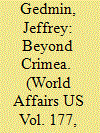

|
|
|
|
|
| Publication |
2014.
|
| Summary/Abstract |
Ukraine is lost. At least lost as many of us had once imagined it-as a potential member of the European Union and, perhaps one day, of NATO. Thank the Kremlin's visionary leader for that. It's striking how confidently and quickly Russian President Vladimir Putin gobbled up Crimea. Although it was a clear-cut case of unprovoked aggression, followed by annexation, the United States and its allies were unable to lift a finger.
|
|
|
|
|
|
|
|
|
|
|
|
|
|
|
|
| 2 |
ID:
132146
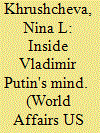

|
|
|
|
|
| Publication |
2014.
|
| Summary/Abstract |
Civilians are dying?.?.?.?in South Ossetia?.?.?.?the majority of them are citizens of the Russian federation.?.?.?.?We will not leave unpunished the deaths of our compatriots. The guilty parties have brought upon themselves the punishment they deserved." This announcement about the invasion of Georgia's territory came from then Russian President Dmitri Medvedev in August 2008. Medvedev was firm, citing the Russian Constitution and federal law, but while it was his lips moving, the words were clearly those of Vladimir Putin.
|
|
|
|
|
|
|
|
|
|
|
|
|
|
|
|
| 3 |
ID:
132147
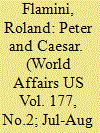

|
|
|
|
|
| Publication |
2014.
|
| Summary/Abstract |
Prior to Pope Francis's visit to the Holy Land, his ambassadors sought to temper expectations by reminding officials in Washington and other capitals that the pontiff himself had called it "strictly a religious trip." Its main purpose, they said, was to mark the fiftieth anniversary of the meeting in Jerusalem between Pope Paul VI and the Orthodox Ecumenical Patriarch Athenagoras-the first such encounter after a thousand years of antagonism between the two churches, Roman Catholic and Orthodox. But in a region where religion and politics are an explosive mix, every word he spoke, every step he took was going to be scrutinized for any hint of support for one side to the disadvantage of the other, and no one knew it better than Francis. But the Argentine-born pope already had a reputation for not avoiding controversial issues-and a gift for making unexpected symbolic gestures to make his point.
|
|
|
|
|
|
|
|
|
|
|
|
|
|
|
|
| 4 |
ID:
132153
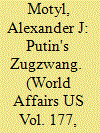

|
|
|
|
|
| Publication |
2014.
|
| Summary/Abstract |
The choice of outcome in the Russia-Ukraine standoff is largely Vladimir Putin's. Ukraine and the West are not powerless, but they can at most anticipate, prepare for, and deter what might be Putin's next move. This does not mean that they are victims of superior statecraft, however. His admirers may regard Putin as a master strategist, whose petulance and unpredictability give him the upper hand in relations with the West and Ukraine. In fact, the opposite is true. Putin has maneuvered himself, and Russia, into a position of Zugzwang-a chess term denoting a condition in which any possible move will worsen the player's position.*
|
|
|
|
|
|
|
|
|
|
|
|
|
|
|
|
| 5 |
ID:
132154
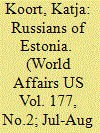

|
|
|
|
|
| Publication |
2014.
|
| Summary/Abstract |
I was born in Kohtla-Jarve, in northeastern Estonia, a city with a chemical plant, an oil shale plant, and several mines. My Russian parents, who had come to Estonia when they were children, had moved there in the 1960s from the capital, Tallinn, to help build the socialist future. My peculiarly named hometown was, and still is, located quite close to the Russian border, but at a time when the radio constantly played the popular song "Moi adres ne dom I ne ulitsa, moi adres Sovetski Soyuz" (My address is not a house or a street, my address is the Soviet Union), the meaning of the border between Estonia and Russia was something completely different for me than it is now. Most ordinary people at the time believed the Russian propaganda, reflected in everything from education to interior design, that all fifteen republics joined the Soviet Union voluntarily. To doubt this-or worse, share your doubts with someone-was a punishable crime. Later I also realized that for us, as Russians, it was easy to believe in the friendship of nations because our ethnic group was clearly in a privileged status in the vast Soviet family.
|
|
|
|
|
|
|
|
|
|
|
|
|
|
|
|
| 6 |
ID:
132157


|
|
|
|
|
| Publication |
2014.
|
| Summary/Abstract |
US and EU sanctions against Russian and Ukrainian officials were subjected to almost as much analysis in Russia as the annexation of Crimea itself. The discussion took place not only in diplomatic and financial circles and in the social media, but at most kitchen tables across the country because the sanctions affect ordinary Russian citizens as well as the higher-ups who were actually targeted.
|
|
|
|
|
|
|
|
|
|
|
|
|
|
|
|
| 7 |
ID:
132149
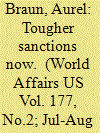

|
|
|
|
|
| Publication |
2014.
|
| Summary/Abstract |
This spring, as Russia's puppet government in Crimea moved clocks forward two hours to coincide with Moscow time, Vladimir Putin seemed intent on moving the historical clock backwards to the age of nineteenth-century Russian imperialism. As the leader of an economically weak and vulnerable country with a corrupt governing class, the Russian president acted with brazen disregard for international law and norms, while the democratic West played a totally reactive role, and a feckless one at that. Ignoring very reluctantly introduced, and very limited, sanctions, Putin reciprocated with utter contempt for capitalist democracies, where he believes profits will always trump principle, and especially for President Obama, who, in the Russian dictator's view, finds Western unity only in weakness, not in strength. But even though what appear to be irreversible faits accomplis occur every day in Crimea and eastern Ukraine, it is not too late for the West to seize the initiative, mobilize its vast economic and political capacity, and put Putin and the "yes" chorus of siloviki, who surround and encourage him, truly on the defensive.
|
|
|
|
|
|
|
|
|
|
|
|
|
|
|
|
| 8 |
ID:
132158
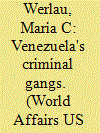

|
|
|
|
|
| Publication |
2014.
|
| Summary/Abstract |
When mass protests against the government erupted in Venezuela early in February, murder rates in the country were already shocking-close to twenty-five thousand people dead in the previous year, with ninety-seven percent of cases going unsolved. They would soon get worse, as motorcycle gangs in civilian clothes began attacking and shooting unarmed citizens, particularly youngsters, with the security forces standing by.
|
|
|
|
|
|
|
|
|
|
|
|
|
|
|
|
| 9 |
ID:
132155


|
|
|
|
|
| Publication |
2014.
|
| Summary/Abstract |
Meeting her Russian counterpart Sergei Lavrov for the first time as secretary of state, Hillary Clinton famously presented him with a red, plastic "reset" button. "We want to reset our relationship and so we will do it together," she explained, adding, "We worked hard to get the right Russian word. Do you think we got it?" "You got it wrong," Lavrov responded.
The problem, in hindsight, was less a botched translation than it was a misunderstanding of the Russian mind. Like too many presidents and secretaries of state before them, President Obama and Secretary Clinton assumed that the problems hampering relations lay more with their predecessors than with America's adversaries. Obama and Clinton were more willing to blame President George W. Bush and Vice President Dick Cheney for what Obama caricatured as knee-jerk hostility to diplomacy with Russia than President Vladimir Putin himself. Putin took full advantage of this mistake.
|
|
|
|
|
|
|
|
|
|
|
|
|
|
|
|
| 10 |
ID:
132151


|
|
|
|
|
| Publication |
2014.
|
| Summary/Abstract |
BOGOTA, Colombia - Elizabeth Ruales remembers the moment it hit: "Like fire melting my skin," she says. "An intense burn."
The bucket of Agricol 50 was meant for use on a construction site. But early last year, the thirty-eight-year-old industrial inspector was attacked with the chemical liquid by an angry male worker named Jose Espinosa after she instructed him to use proper safety measures, causing burns on her face, neck, arms, and legs. More than a year later, the mother of two still has no vision in her left eye and wears a bandage that covers her left cheek, where her deepest wound still festers.
|
|
|
|
|
|
|
|
|
|
|
|
|
|
|
|
| 11 |
ID:
132150
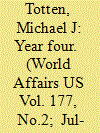

|
|
|
|
|
| Publication |
2014.
|
| Summary/Abstract |
Shortly after the Arab Spring broke out at the tail end of 2010, two narratives took hold in the West. Optimists hailed a region-wide birth of democracy, as though the Middle East and North Africa were following the path blazed in Eastern Europe during the anti-communist revolutions of 1989. Pessimists fretted that the Arab world was following Iran's example in 1979 and replacing secular tyrants with even more repressive Islamist regimes.
|
|
|
|
|
|
|
|
|
|
|
|
|
|
|
|
|
|
|
|
|